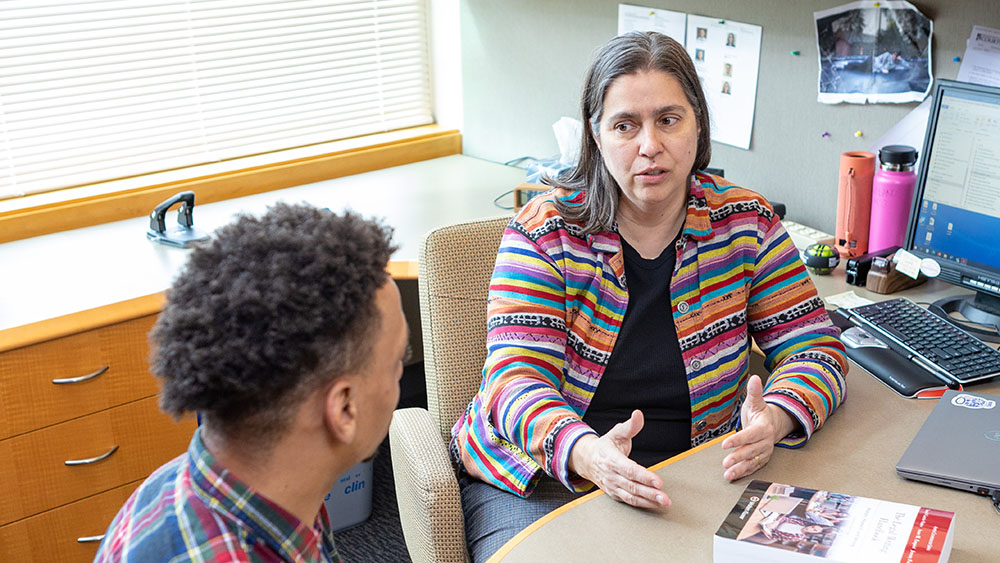
What makes a top-ranked program?
Our Integrated Skills Program.
Integration within the law school
Our top-ranked Legal Writing Program is an integral part of the law school.
- Our first-year course, Legal Writing, Skills, & Values, was developed as a joint effort among the Legal Writing faculty, the Clinical and Externship faculty, the professional librarians, the Center for Professional Development, and the Access to Justice Institute. This collaborative effort resulted in a course that prepares students for their upper-division experiential courses, including clinics and externships, as well as for the "real world" beyond law school.
- Beyond planning the course, clinicians, librarians, and representatives from the career center often come to first-year classes to meet with students and to guest lecture on topics including building a professional identity, research, and negotiation.
- Additionally, our clinical faculty work closely with our legal writing faculty to ensure that the clinical and externship courses that students take in their second and third years of law school build on the foundation created by our legal writing program. We coordinate readings and exercises so that students can apply what they learned in legal writing to their experiential learning classes later in law school.
- The second-year Legal Writing course feeds into the law school’s Tausend and Bond Moot Court Competitions, which are run jointly with the Moot Court Board.
- Students who excel in legal writing also have a chance to leverage those skills through various writing scholarships and competitions.
Integration with Alumni and the Community
- In the first-year Legal Writing class, many professors ask alumni who are engaged in different areas of the law to come to class to reflect on their own law school experiences and their paths since law school.
- The second-year course, Legal Writing II, which focuses on persuasive writing and oral advocacy, culminates in an appellate oral argument in which the “judges” are local practitioners and real judges, many of whom are our alumni.
- The Tausend or Bond Moot Court Competitions offered to high-performing students in Legal Writing II are also judged by local attorneys and judges. The top participants in these competitions also gain the opportunity to compete in other regional and national moot court competitions.
Integration with Social Justice Efforts
Real Clients in the First Year is an innovative element of the Legal Writing curriculum where all 1L students work on a social justice-focused case with our legal clinic or with legal nonprofits.
- In the spring semester of the first year, after learning the process that lawyers use to research and analyze legal issues, students research and analyze a “real life” issue at the request of the clinic or nonprofit and then present their results to a representative of that organization.
- Since we started this program, students have worked on a range of issues, including immigration law, language access in the courts, wage theft, treatment of incarcerated pregnant women, and many others.
- Our clinic and nonprofit partners have used students’ work to successfully challenge certain actions, support changes to administrative regulations, and assist with lobbying for legislative changes.
- While typically a challenging assignment, students typically find it to be very rewarding. Here is one sample comment:
Thank you for a very interesting final paper topic. It was an incredibly complex matter to look at and write about, but I can safely say that this project and Eric coming to our class and speaking with us on the occasions that he did was the highlight of my first year of law school. Although my general interest in international law and background in commercial law and transactions will continue to direct my legal studies focus, I plan on pursuing Indian law studies as much as possible, and intend to do what it takes to incorporate some Indian law practice into my work in the future. I find the issues that Indian law encompasses to be very compelling, particularly the way their laws relate to non-Indians and tribal relations with the U.S. I moved around a bit growing up, and I lived in northern New Mexico throughout all of high school. The research, Eric's thoughts, and your direction, all gave me a lot of time to reflect on my experiences there and piqued my already simmering interest in looking into this area of the law some more. I realize that the primary purpose of our paper was writing related, but it was really encouraging to have you engage us in material like this and to help us in working through these issues and present us with direction that enabled us to gain an understanding of the material and formulate our own elementary ideas about the subject matter. Regardless of what my paper looks like writing wise, I know that undertaking the assignment did benefit me quite a bit, so thank you!
Here, too, is a sample comment from a satisfied partner organization:
A VERY BIG THANK YOU to Erin Carr and her students at Seattle University School of Law for the amazing research and presentations on Environmental Justice. This has been one of our most unique and treasured collaborations to finding solutions for systemic issues related to Fair Housing and equal justice. Thank you!!

Contact us
Kathryn Boling
Director
206-398-4019
kboling@seattleu.edu
Lori Lamb
Sr. Administrative Assistant
206-398-4033
lambl@seattleu.edu